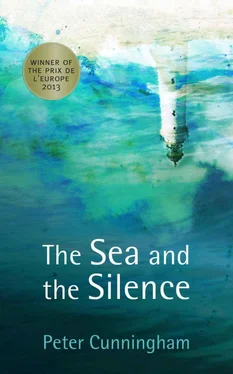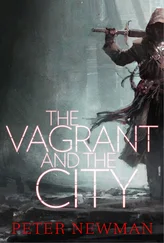When Hector’s letter arrived at last — he had been on manoeuvres — it seemed almost flippant and assumed that the separation was temporary, for he asked whether if he came home for Christmas I would be back in Sibrille by then. I replied, explaining the now-legal nature of affairs, and how I had wanted nothing except my freedom. Although I did not say so to Hector, I realised that what freedom meant was that I would be living on my own from then on and be like the many women forced to refashion their lives from the unfriendly starting point of middle age. Ronnie, on the other hand, planned never to be alone. I learned from Bibs Toms that Lucy had put her father into the County Home, sold the farm and moved into the lighthouse. Ronnie had turned the corner.
I lived on remarkably little. With the help of my lovely Dick Coad, I made a flat in the garden basement and secured a tenant. My new circumstances, in which money was not a constant, unspoken problem, made me realise how insecure we had been in Sibrille and how that state of affairs, created and sustained by Ronnie, had contributed to my mute acquiescence. I joined the Royal Dublin Society where, thirty years before, my father, then a member, had brought me to the Spring Show. One or two people still spoke of him.
Hector’s letter in the summer was a sprawling half a dozen pages. It appeared he had come to Ireland and gone to Sibrille unannounced — to me a hurtful piece of information — and discovered Lucy. It had, by his own admission, been an ugly scene. Things broken, Lucy screaming and driving away, Ronnie putting Hector out at the point of a shotgun. Hector had walked to Monument where he had booked into the Commercial Hotel and, he wrote, for two days had gone on a bad bender. Ronnie had come into town, but Hector had refused to see him. Nor did he want to face coming to see me in Dublin, so ashamed was he of everything that had taken place. I read a new maturity in his letter. He said he never again wanted to meet Ronnie and asked me to come to England. My reaction was mixed. Absurd as it would be for me to be pleading Ronnie’s case, neither would I try to prosper in Hector’s affections by damning him. Not that I had anything but contempt for my husband; rather, I wanted to spare my son the debilitating environment of hate. So I spent several days over my reply, attempting to achieve a balance and hoping that in Hector’s new wisdom, I would find the consolation for which I ached. But before my letter could be posted, word came from Dick Coad in Monument to say that Langley Shaw was dead.
We drove south in late August sunshine in a car rented by Hector at Dublin Airport. I had brought a picnic basket and we stopped along the coast at a place where wooden benches overlooked the flat Irish Sea.
‘How are you coping?’ he asked.
We both had the same green eyes, but Hector’s had been newly wrought by a process of pain.
‘Better. No problems about money, for one thing. And life is always better when something nasty has been confronted.’
‘You look well.’
‘Thank you, Hector.’
‘Have you… is there…’
‘No, there is no one.’
‘I’m sorry. I just wanted you to know that if there was, I shouldn’t mind.’
‘That is very sweet of you.’
I took his hand and warmed my cheek with it. He had filled out into a man and his hair was cut short except for a quiff at the front that fell over his forehead. I looked at his big hands and wondered what kind of a woman he would find.
‘What about you? They must all be swooning over you.’
‘Nothing too serious, Mother, don’t worry.’
‘I won’t. I’m sure she’ll be lovely.’
‘She’ll be like you.’
‘Oh, Hector, that’s kind but you mustn’t waste your life looking for a younger me. It’s not worth it.’
‘I have to make that decision.’
As the peak of Dollan came into view, he asked, ‘Are you going to speak to him?’
‘I shall sympathise with him.’
‘I shan’t. I think he has let us down in a way that is beyond forgiveness.’
‘I find that concept difficult, Hector.’
He pulled in at one of the bends in the foothills as the town appeared all at once below us.
‘You could have left him, couldn’t you?’
‘What do you mean?’
‘You were in love with someone else, that doctor who came from England after Ronnie’s accident.’
‘You mean Hedley Raven? Where on earth did you get that idea?’
‘Rosa Santry told me.’
‘Rosa Santry?’
Hector covered my hand with his.
‘When I was in Monument last year, Rosa came in to see me. Dick Coad asked her to, I think. They thought I was going to top myself or something. Beautiful woman. She told me that years ago she saw you and this English doctor together on the riverbanks in Main. She said you were in love.’
I could not stem my tears, nor even protest innocence. ‘I didn’t know she saw us.’
‘As long as it wasn’t my fault.’
‘How could it possibly have been your fault?’
‘You probably thought you had to stay with Ronnie on account of me.’
Shame rose within me like a monster. ‘Hector, he meant nothing. Believe me, he was nothing at all.’
Hector had reserved two rooms in the Commercial. It seemed eerie being in lodgings once again in a town I had come to know so well. Before supper, I went for a walk down Long Quay. Attended by swarms of seagulls, trawlers were discharging their boxes of catch. Farther down the wharf, a ship was taking on lumber as members of her crew, their eyes white in their dark faces, leant over the deck rails and smoked cigarettes. I thought, for all its size, how much more tame Dublin was than Monument, how in Dublin one lived in settled, leafy suburbs untouched by commerce or the smell of fish or foreign tobacco. Hector, because of everything that had happened, because of how he now saw Ronnie, would never come to live here, might never, in fact, come back here again. For both our sakes, I had hoped he might return: for his own, because I valued Monument so dearly on his behalf; and for mine because I had imagined myself coming down to visit him. He was in the bar reading the evening paper when I came back in. The front page showed that Ulster was on fire: buses and cars alight, riots in the cities.
‘There’s talk of us being sent, you know,’ he said as we sat down either side of an upright plastic menu wedged in a block of wood. ‘To keep both sides apart.’
I felt myself go dizzy. ‘I’d prefer if you didn’t.’
Hector smiled at me kindly. ‘It’s part of my job, Mother.’
I had not ever thought of this, but now it seemed grotesque.
Hector was saying, ‘It may all fizzle out. We may not be sent at all. God, I’m hungry. D’you think their steak is any good?’
There and then, I wanted to tell him what I had sworn I never would, but I needed time to think and to prepare myself.
Hector was saying, ‘You like it down here, don’t you? Do you have to live in Dublin… I mean, just because that’s where you own a house?’
‘I think by living in Dublin I can love Monument best.’
‘I’ll never live here,’ he said. ‘Not because I’m afraid of bumping into Ronnie — I couldn’t care less, to be frank — but, and this sounds odd, I’ve never felt I belong here.’
‘What do you mean?’
‘It’s an inner thing. I feel more at home in England than in Ireland, and that’s being honest.’
‘You do belong here, Hector, believe me,’ I said. ‘Monument is where you belong.’
Langley had been brought to Sibrille’s church and next morning we got there early to put our flowers on his coffin. Local people stood outside the church door and removed their hats when they saw me. My nostrils were met by the smell of candle wax as we walked in and the heels of our shoes echoed in the empty church.
Читать дальше












![Edward Ellis - Adrift on the Pacific - A Boys [sic] Story of the Sea and its Perils](/books/753342/edward-ellis-adrift-on-the-pacific-a-boys-sic-s-thumb.webp)